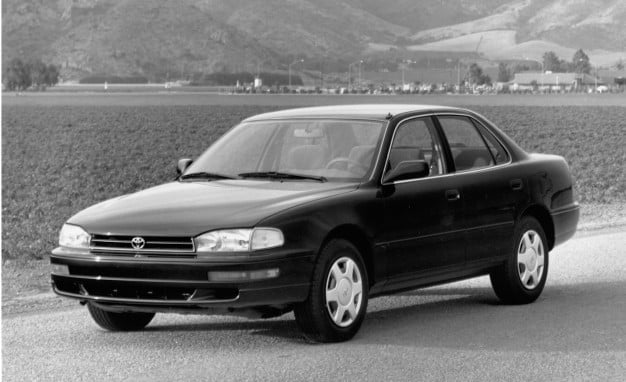
An elderly woman is crying profusely over the phone, and all anyone can do is listen and try to console her. Through no fault of her own, she’s now beside herself with a $7000 repair estimate for a car that has become a 3500-pound paperweight. The only thing she knows about cars is how to drive one. Guess who was responsible for this tragic scene? The guy writing this article.
That’s right. I was guilty—not by intent, but by association and anecdotal experience. Guess who recommended to her that she buy that car? Yep, that was me. I bought a reliable version of the same model—a car that’s still on the road with 350,000-plus miles on the odometer—more than 20 years ago. In fact, my evangelizing about the reliability of that daily driver, a 1994 Toyota Camry coupe, eventually led my family to buy four more Camrys. Between 1994 and 2012, those were the only cars bought by my parents and brothers. I drank the industry Kool-Aid that makes many of us believe that, out of that ocean of millions of cars, only a few chosen models can offer you true long-term reliability.
That’s no longer true. Soon after that woman on the phone (my mom) was given that jaw-dropping estimate, I decided to do two things. First, I replaced a sensor and told the dealer where he could stick that estimate. And second, I became involved with a project called the Long-Term Quality Index (LTQI), a four-year-old, collaborative effort that studies the reliability of used cars. The study now includes data on more than 1.4 million vehicles that have been independently inspected by certified mechanics. When it comes to used-car shopping, this is a smidgen of what has been found so far:

Sports Cars Often Are the Most Reliable Cars
Let us give you an example that hit us right between the eyes. The Toyota Camry has long been hailed as reliability incarnate, along with the Honda Accord, the Toyota Corolla, and the Honda Civic. We at the Long-Term Quality Index expected those models to be right at the top.
But guess which older, used vehicles outperform all of them according to LTQI data? A Ford Explorer? A Chevrolet Silverado? Nope, not even close. Try sports cars and roadsters such as the Mazda MX-5 Miata, the Chevrolet Corvette, the Mercedes SL-class, and the BMW Z3 and Z4 convertibles. As time passes, two big ingredients help these models offer one tasty recipe for long-term reliability: care-conscious owners and strong powertrains make a real difference.
After years and sometimes even decades, these four sports cars provide outstanding reliability because they offer the perfect combination that makes longevity a reality: attentive owners who usually install quality replacement parts, and powertrains designed to withstand demands that go beyond daily driving. (More on this point can be found here.)
Cars with Reliable Reputations Can Also Be Rolling Money Traps
A 10-year-old Camry sounds like a great idea until you find out about frequent engine issues and melting dashboards. LTQI data shows that a Camrys of that vintage are just middle-of-the-pack, not leaders. And another similarly well-regarded vehicle, the Honda Accord, has good years and bad years thanks to chronic transmission issues that apparently took several years to resolve.
Unpopular Cars Can Be Reliable . . . and Dirt Cheap
You don’t have to buy an old person’s car like a Buick Park Avenue or Lincoln Town Car to buy a car that lasts. Fun can be had along with long-term quality if you spread your search to the unpopular cars. Volkswagen is a damaged brand at the moment, and many of its powertrains aren’t a good deal. But if you stick with a manual transmission, and an engine that doesn’t have a turbocharger or direct injection, you may be able to get a quality vehicle at a discount thanks to all the bad publicity these days.

And Unloved Badge-Engineered Siblings Are Even Better
Have you ever heard of a Suzuki Equator? It’s a version of the mid-size Nissan Frontier truck with different badging that nobody ever shops for because Suzuki hasn’t sold new cars in the United States since 2012. This lack of advertising makes the Equator thousands of dollars cheaper than the Frontier while offering the same level of quality. The Equator also came with a 7-year/100,000-mile powertrain warranty, unlike the Frontier. That same lack of new-car advertising made the Pontiac Vibe compact cheaper than its genetically identical clone, the Toyota Corolla Matrix.
The Toyota Camry was the right decision for my family, until it wasn’t. Quality can change over time. So choose a smart path. Invest time in questioning the owner. Make condition your priority, and don’t talk yourself out of buying a car that’s fast and fun. Sometimes the best deals are exactly where you wouldn’t expect to find them.
Steve Lang has been an auto auctioneer, car dealer, and part owner of an auto auction for nearly two decades.
[“Source-caranddriver”]





